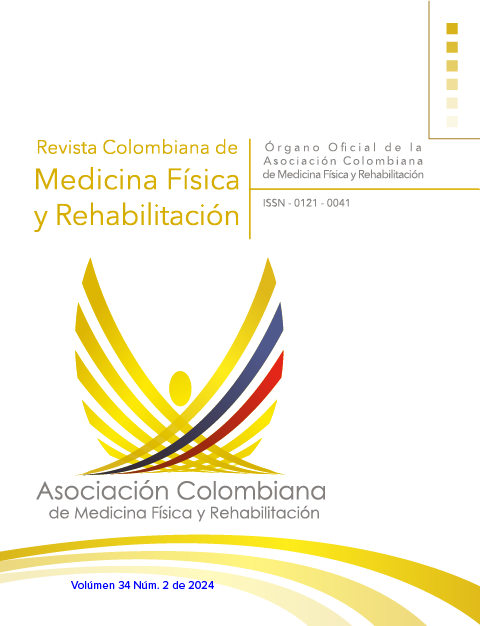Pilates exercises to improve balance in patients with multiple sclerosis. Systematic review
DOI:
https://doi.org/10.28957/rcmfr.444Keywords:
Pilates training, postural balance, multiple sclerosis, ystematic reviewAbstract
Introduction. Multiple sclerosis is a chronic progressive and neurodegenerative disease whose incidence and prevalence rates are increasing worldwide. One of the problems that patients with this disorder present is the lack of balance due to the progressive degradation of myelin, for which Pilates has recently been suggested as an intervention method.
Objective. To conduct a systematic review of the literature on the efficacy of performing Pilates exercises to improve balance in patients with multiple sclerosis.
Methods. A systematic review of the literature was conducted following the protocol of the PRISMA statement. The PubMed, CINAHL, PsycINFO, SPORTDiscus, Academic Search Complete, LILACS, IBECS, Cochrane Controlled Register of Trials (CENTRAL), SciELO and Web of Science (WOS) databases were consulted.
Results. 72 studies were obtained and after removing duplicates and applying the inclusion criteria, 6 trials with a total of 208 patients were selected for inclusion in the analysis. The duration of the Pilates program ranged between 6 and 12 weeks and all studies demonstrated safety with the use of the Pilates method and that no major side effects occurred with the implementation thereof.
Conclusions. Pilates exercises are effective to improve balance in patients with multiple sclerosis and are a treatment alternative superior to standard care. This methodology also improves walking ability, functional mobility, postural stability, sensory interaction, quality of life, strength, endurance, walking speed, respiratory and cognitive functions, and also decreases fatigue and known risk factors for falls.
References
Olek MJ. Multiple Sclerosis. Ann Intern Med. 2021;174(6):ITC81-ITC96. Disponible en: https://doi.org/10.7326/AITC202106150.
Oh J, Vidal-Jordana A, Montalban X. Multiple sclerosis: clinical aspects. Curr Opin Neurol. 2018;31(6):752-9. Disponible en: https://doi.org/10.1097/WCO.0000000000000622.
Dobson R, Giovannoni G. Multiple sclerosis - a review. Eur J Neurol. 2019;26(1):27-40. Disponible en: https://doi.org/10.1111/ene.13819.
Cotsapas C, Mitrovic M, Hafler D. Multiple sclerosis. Handb Clin Neurol. 2018;148:723-30. Disponible en: https://doi.org/10.1016/B978-0-444-64076-5.00046-6.
Kuhlmann T, Moccia M, Coetzee T, Cohen JA, Correale J, Graves J, et al. Multiple sclerosis progression: time for a new mechanism-driven framework. Lancet Neurol. 2023;22(1):78-88. Disponible en: https://doi.org/10.1016/S1474-4422(22)00289-7.
Ward M, Goldman MD. Epidemiology and Pathophysiology of Multiple Sclerosis. Continuum (Minneap Minn). 2022;28(4):988-1005. Disponible en: https://doi.org/10.1212/CON.0000000000001136.
McGinley MP, Goldschmidt CH, Rae-Grant AD. Diagnosis and Treatment of Multiple Sclerosis: A Review. JAMA. 2021;325(8):765-79. Disponible en: https://doi.org/10.1001/jama.2020.26858.
Travers BS, Tsang BK, Barton JL. Multiple sclerosis: Diagnosis, disease-modifying therapy and prognosis. Aust J Gen Pract. 2022;51(4):199-206. Disponible en: https://doi.org/10.31128/AJGP-07-21-6103.
Amin M, Hersh CM. Updates and advances in multiple sclerosis neurotherapeutics. Neurodegener Dis Manag. 2023;13(1):47-70. Disponible en: https://doi.org/10.2217/nmt-2021-0058.
Solomon AJ, Arrambide G, Brownlee WJ, Flanagan EP, Amato MP, Amezcua L, et al. Differential diagnosis of suspected multiple sclerosis: an updated consensus approach. Lancet Neurol. 2023;22(8):750-68. Disponible en: https://doi.org/10.1016/S1474-4422(23)00148-5.
Jakimovski D, Bittner S, Zivadinov R, Morrow SA, Benedict RH, Zipp F, et al. Multiple sclerosis. Lancet. 2024;403(10422):183-202. Disponible en: https://doi.org/10.1016/S0140-6736(23)01473-3.
Vasileiou ES, Fitzgerald KC. Multiple Sclerosis Pathogenesis and Updates in Targeted Therapeutic Approaches. Curr Allergy Asthma Rep. 2023;23(9):481-96. Disponible en: https://doi.org/10.1007/s11882-023-01102-0.
Haki M, Al-Biati HA, Al-Tameemi ZS, Ali IS, Al-Hussaniy HA. Review of multiple sclerosis: Epidemiology, etiology, pathophysiology, and treatment. Medicine (Baltimore). 2024;103(8):e37297. Disponible en: https://doi.org/10.1097/MD.0000000000037297.
Marrie RA, Fisk JD, Fitzgerald K, Kowalec K, Maxwell C, Rotstein D, et al. Etiology, effects and management of comorbidities in multiple sclerosis: recent advances. Front Immunol. 2023;14:1197195. Disponible en: https://doi.org/10.3389/fimmu.2023.1197195.
Kaisey M, Solomon AJ. Multiple Sclerosis Diagnostic Delay and Misdiagnosis. Neurol Clin. 2024;42(1):1-13. Disponible en: https://doi.org/10.1016/j.ncl.2023.07.001.
Samjoo IA, Drudge C, Walsh S, Tiwari S, Brennan R, Boer I, et al. Comparative efficacy of therapies for relapsing multiple sclerosis: a systematic review and network meta-analysis. J Comp Eff Res. 2023;12(7):e230016. Disponible en: https://doi.org/10.57264/cer-2023-0016.
Hao Z, Zhang X, Chen P. Effects of Different Exercise Therapies on Balance Function and Functional Walking Ability in Multiple Sclerosis Disease Patients-A Network Meta-Analysis of Randomized Controlled Trials. Int J Environ Res Public Health. 2022;19(12):7175. Disponible en: https://doi.org/10.3390/ijerph19127175.
Sampaio T, Encarnação S, Santos O, Narciso D, Oliveira JP, Teixeira JE, et al. The Effectiveness of Pilates Training Interventions on Older Adults’ Balance: A Systematic Review and Meta-Analysis of Randomized Controlled Trials. Healthcare (Basel). 2023;11(23):3083. Disponible en: https://doi.org/10.3390/healthcare11233083.
Kim Y, Lai B, Mehta T, Thirumalai M, Padalabalanarayanan S, Rimmer JH, et al. Exercise Training Guidelines for Multiple Sclerosis, Stroke, and Parkinson Disease: Rapid Review and Synthesis. Am J Phys Med Rehabil. 2019;98(7):613-21. Disponible en: https://doi.org/10.1097/PHM.0000000000001174.
Learmonth YC, Motl RW. Exercise Training for Multiple Sclerosis: A Narrative Review of History, Benefits, Safety, Guidelines, and Promotion. Int J Environ Res Public Health. 2021;18(24):13245. Disponible en: https://doi.org/10.3390/ijerph182413245.
Page MJ, McKenzie JE, Bossuyt PM, Boutron I, Hoffmann TC, Mulrow CD, et al. The PRISMA 2020 statement: an updated guideline for reporting systematic reviews. BMJ. 2021;372:n71. Disponible en: https://doi.org/10.1136/bmj.n71.
da Costa Santos CM, de Mattos Pimenta CA, Nobre MR. The PICO strategy for the research question construction and evidence research. Rev Latino-Am Enfermagem. 2007;15(3):508-11. Disponible en: https://doi.org/10.1590/s0104-11692007000300023.
Higgins JPT, Thomas J, Chandler J, Cumpson M, Li T, Page MJ, et al., editors. Cochrane Handbook for Systematic Reviews of Interventions. 2da edición. WILEY Blackwell; 2019.
Ouzzani M, Hammady H, Fedorowicz Z, Elmagarmid A. Rayyan—a web and mobile app for systematic reviews. Syst Rev. 2016;5(1):210. Disponible en: https://doi.org/10.1186/s13643-016-0384-4.
Soysal-Tomruk M, Uz MZ, Kara B, İdiman E. Effects of Pilates exercises on sensory interaction, postural control and fatigue in patients with multiple sclerosis. Mult Scler Relat Disord. 2016;7:70-3. Disponible en: https://doi.org/10.1016/j.msard.2016.03.008.
Kalron A, Rosenblum U, Frid L, Achiron A. Pilates exercise training vs. physical therapy for improving walking and balance in people with multiple sclerosis: a randomized controlled trial. Clin Rehabil. 2017;31(3):319-28. Disponible en: https://doi.org/10.1177/0269215516637202.
Bulguroglu I, Guclu-Gunduz A, Yazici G, Ozkul C, Irkec C, Nazliel B, et al. The effects of Mat Pilates and Reformer Pilates in patients with Multiple Sclerosis: A randomized controlled study. NeuroRehabilitation. 2017;41(2):413-22. Disponible en: https://doi.org/10.3233/NRE-162121.
Abasıyanık Z, Ertekin Ö, Kahraman T, Yigit P, Özakbaş S. The effects of Clinical Pilates training on walking, balance, fall risk, respiratory, and cognitive functions in persons with multiple sclerosis: A randomized controlled trial. Explore (NY). 2020;16(1):12-20. Disponible en: https://doi.org/10.1016/j.explore.2019.07.010.
Gheitasi M, Bayattork M, Andersen LL, Imani S, Daneshfar A. Effect of twelve weeks pilates training on functional balance of male patients with multiple sclerosis: Randomized controlled trial. J Bodyw Mov Ther. 2021;25:41-45. Disponible en: https://doi.org/10.1016/j.jbmt.2020.11.003.
Eldemir K, Guclu-Gunduz A, Eldemir S, Saygili F, Ozkul C, Irkec C. Effects of Pilates-based telerehabilitation on physical performance and quality of life in patients with multiple sclerosis. Disabil Rehabil. 2024;46(9):1807-14. Disponible en: https://doi.org/10.1080/09638288.2023.2205174.
Arik MI, Kiloatar H, Saracoglu I. Do Pilates exercises improve balance in patients with multiple sclerosis? A systematic review and meta-analysis. Mult Scler Relat Disord. 2022;57:103410. Disponible en: https://doi.org/10.1016/j.msard.2021.103410.
Sánchez-Lastra MA, Martínez-Aldao D, Molina AJ, Ayán C. Pilates for people with multiple sclerosis: A systematic review and meta-analysis. Mult Scler Relat Disord. 2019;28:199-212. Disponible en: https://doi.org/10.1016/j.msard.2019.01.006.
Marques KAP, Trindade CBB, Almeida MCV, Bento-Torres NVO. Pilates for rehabilitation in patients with multiple sclerosis: A systematic review of effects on cognition, health-related physical fitness, general symptoms and quality of life. J Bodyw Mov Ther. 2020;24(2):26-36. Disponible en: https://doi.org/10.1016/j.jbmt.2020.01.008.
How to Cite
Downloads
Downloads
Published
Issue
Section
License
Copyright (c) 2024 Revista Colombiana de Medicina Física y Rehabilitación

This work is licensed under a Creative Commons Attribution-NonCommercial-NoDerivatives 4.0 International License.

| Article metrics | |
|---|---|
| Abstract views | |
| Galley vies | |
| PDF Views | |
| HTML views | |
| Other views | |


